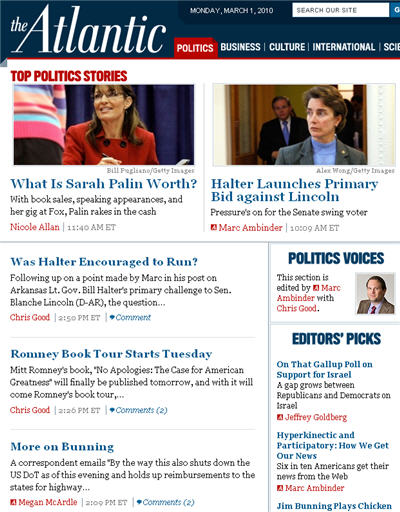Atlantic Redesign: The Medium is the Message
 Since hiring Andrew Sullivan and a slew of other already-established bloggers a couple years back, the Atlantic Monthly website has gone through quite a few design changes. But last week’s total reorganization of the site into a series of channels, subsuming all the blogs except Andrew’s into what amounts to collections of links to archives, has unleashed a fury in the comments sections and main posting areas of the blogs in question and in the general blogsophere.
Since hiring Andrew Sullivan and a slew of other already-established bloggers a couple years back, the Atlantic Monthly website has gone through quite a few design changes. But last week’s total reorganization of the site into a series of channels, subsuming all the blogs except Andrew’s into what amounts to collections of links to archives, has unleashed a fury in the comments sections and main posting areas of the blogs in question and in the general blogsophere.
The general consensus, which I share, is that the new setup is not only goddawful bad but goes against some of the very tenets of the blogosphere. Still, I’m somewhat bemused by the fuss since I mostly read the blogs in question via RSS and hadn’t really noticed much change.
The most interesting takes on the change:
“A reader” of Sully’s site who says he was an AOL content manager in 1998 when that company made a similar move. He contends it was an abject disaster and claims it was the beginning of the end for the company.
Sullivan himself, interrupting his vacation to explain what a damned mess it is, while acknowledging that the Atlantic’s business model currently doesn’t make any sense so he hopes this helps in that regard. (Which reminds me of a discussion I had with Matt Yglesias a while back, wherein he cited not understanding how they could keep paying him when they were losing money as a reason for moving on from the Atlantic to his current trappings at CAPAF.)
Fundamentally, though, Sully explains,
[A] blog is inherently a live process and conversation and anyone who actually understands blogging’s intimate relationship to its readership – and the critical importance of conversation to the endeavor – would never have dreamed of turning it into a series of headlines. That’s what worries me deeply. Not the inevitable transitional glitches but the philosophy behind it.
[…]
But treating blogs as a series of headlines, designed to maximize pageviews, is a deep misunderstanding of blogs, their reader communities and their integrity. I hope they get restored to their previous coherence, and these amorphous “channels” gain some editorial identity. I hope writers like Fallows and Goldberg aren’t treated as random fodder – anchors! – for “channels”. I believe in the Atlantic as a place for writing. The redesign seems to me to ooze casual indifference to that and to the respect that individual writers deserve.
E.D. Kain agrees and adds,
There is something spontaneous and personal about blogging that is a serious if intangible change from traditional journalism. It is also, I think, the most important thing about a successful blogger — this ability for readers to connect and empathize with them. Similarly the community created around a blogger or a project is vitally important. Jaybird has likened our own humble digs to a bar where we can all sit around and talk politics and culture and whatever over beers.
[…]
However, one of our original intentions with this site was to create a place where sustained, internal dialogue between writers, commenters, and guest-writers could be nurtured and grow into something rather unlike anything else on the interwebs. I think, to some degree, in our push to increase traffic, to link to (and be linked by in return) Really Important Bloggers, we have let that part of our mission fall to the wayside. I know others here have expressed a similar sense that this is the case. Whether this has been an inevitable side-effect to creating a successful site, or to simply running out of things to talk to each other about is hard to say.
Ezra Klein, whose own meteoric blogging career has taken him to the Washington Post, piles on:
I’d hate to be at a publication that paved over my blog in order to bring more attention to content-specific “channels.” I’d be even more furious if my employer adopted a template that prevented readers from reading the front page of the blog all at once. Forcing the audience to click on each post individually (which Time also does) might be good for advertising impressions, but it makes for a terrible reader experience, and that has consequences for your traffic. I no longer read Time’s Swampland frequently, despite really liking the people who write it. That also means I link to Swampland less often, which means they get somewhat less traffic than they otherwise might. I don’t know if that sort of thing has a measurable impact, but it wouldn’t shock me if it did, and I doubt it’s something that the business side thinks about.
But, like the lone Atlantic blogger enthusiastic about the new design, Jeffrey Goldberg, Ezra understands why it had to be tried.
As things stood a week ago, there really was no Atlantic online. Instead, there was a respected magazine called The Atlantic Monthly that had agreed to offer web hosting to a certain number of blogs. You never heard anyone say “did you read the Atlantic online today?” Instead, it was whether you’d read Ta-Nehisi, or Andrew, or Fallows. The magazine designated them “voices,” but the redesign suggests that it eventually realized they were the only ones being heard.
The problem for the Atlantic is that they were a monthly institution entering a daily medium. Some magazines, like The American Prospect and The New Republic, solved that problem by accelerating their publication cycle to include daily Web articles and telling their staffs to blog. But some, like the Atlantic and the Washington Monthly, held back on changing the actual institution, and instead hired bloggers with existing audiences to come create daily content under the magazine’s banner.
That worked out fine until the magazine wanted an online presence of its own only to realize that their acquisition strategy had left them an audience loyal to the individual “voices” rather than to the brand.
The Atlantic’s redesign seems like a bet to re-center the Web site around the Atlantic as an institution rather than leaving it as a web hosting service for a couple of bloggers. What’s causing the outcry is that in order to drive traffic to the new channels, they’re integrating the blogs (save for the traffic-generating beast that is Sullivan’s Daily Dish) into the channels. That way the readers of Ta-Nehisi’s blog, to use one example, will become readers of the culture channel, which includes Ta-Nehisi’s content.
I think that’s right. Sullivan reports that his blog alone accounts for “55 to 60 percent” of the Atlantic‘s traffic. That gives him enormous power, of course — indeed, while his redesigned site isn’t nearly as nice as the previous iteration, they were smart enough not to crunch it in the way they did the other blogs — but it makes him stronger than the company.
When the Washington Monthly hired CalPundit’s Kevin Drum eons ago, I followed him to their website. Indeed, he essentially was their website. But, aside from the occasional article that Kevin would plug or that would catch my eyeballs while on the site, I really didn’t think of WashingtonMonthly.com as anything other than “Kevin’s new URL.” When he moved to MotherJones, I moved with him. The only reason I still visit WashingtonMonthly.com is because they replaced Kevin with Steve Benen, who I was likewise already reading.
The Atlantic is different, in that I actually care about the print edition independent of the bloggers. That Megan McArdle and Andrew Sullivan occasionally pen pieces for the print edition hasn’t really increased my interest all that much and the fact that their blogs are now hosted on a prestige magazine’s site really doesn’t increase my opinion of them, either. What the marriage does do, however, is bolster the site’s brand as a place to read smart writing on politics and world affairs.
Still, if Sullivan gets a better offer — or decides to leave for whatever reason — he simply takes half the site’s audience with him. (If not more, since I suspect a goodly portion of the traffic for the other blogs is directly attributable to Andrew and his staff linking their content.)
But I don’t know how to fix the business model. The fact of the matter is that opinion magazines, which are by definition aimed at an elite audience, have long leaked money like sieves. Unless they can find benefactors to endow them out of love, they simply can’t survive.
UPDATE: While the above post focused on the merits of what I find to be an interesting argument, I agree with Slate’s Daniel Gross that “the spectacle of the Atlantic’s bloggers crapping all over the site’s redesign” is “very bad form.” In a follow-up, he quips, “What I’d really like to read: the Atlantic’s development team telling us what they think of Clive Crook’s blog.”





I’m only reading Megan’s blog on their webserver. The new version is atrocious… Doesn’t play well on my Droid’s browser.
I have 2 of their blogs in my RSS feeds – Megan McArdle and Sully, so I haven’t seen anything as I rarely go to the actual site. I read Megan’s, skim Sully’s feeds using Sharpreader and FeedDemon (soon to be only FeedDemon).